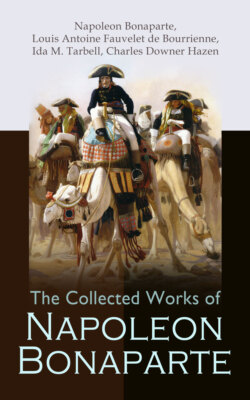Читать книгу The Collected Works of Napoleon Bonaparte - Charles Downer Hazen, Louis Antoine Fauvelet de Bourrienne - Страница 208
На сайте Литреса книга снята с продажи.
SERIES I
ОглавлениеNo. 1.
Bayonne is half-way between Paris and Madrid, nearly 600 miles from each. Napoleon arrived here April 15th, and left July 21st, returning with Josephine viâ Pau, Tarbes, Auch, Montauban, Agen, Bordeaux, Rochefort, Nantes. Everywhere he received a hearty welcome, even, and especially, in La Vendée. He arrives at Paris August 14th, hearing on August 3rd at Bordeaux of (what he calls) the "horrible catastrophe" of General Dupont at Baylen.
No. 2.
A country-house.—The Château of Marrac. Marbot had stayed there in 1803 with Augereau. Bausset informs us that this château had been built either for the Infanta Marie Victoire engaged to Louis XV., or for the Dowager Queen of Charles II., "the bewitched," when she was packed off from Madrid to Bayonne (see Hume's Spain, 1479-1788).
Everything is still most primitive.—Nevertheless he enjoyed the pamperruque which was danced before the château by seven men and ten maidens, gaily dressed—the women armed with tambourines and the men with castanets. Saint-Amand speaks of thirteen performers (seven men and six maidens) chosen from the leading families of the town, to render what for time immemorial had been considered fit homage for the most illustrious persons.
No. 3.
Prince of the Asturias.—The Emperor had received him at the château of Marrac, paid him all the honours due to royalty, while evading the word "Majesty," and insisting the same day on his giving up all claim to the Crown of Spain. Constant says he was heavy of gait, and rarely spoke.
The Queen.—A woman of violent passions. The Prince of the Asturias had designs on his mother's life, while the Queen openly begged Napoleon to put the Prince to death. On May 9th Napoleon writes Talleyrand to prepare to take charge of Ferdinand at Valençay, adding that if the latter were "to become attached to some pretty woman, whom we are sure of, it would be no disadvantage." A new experience for a Montmorency to become the keeper of a Bourbon, rather than his Constable. Pasquier, with his usual Malvolian decorum, gives fuller details. Napoleon, he says, "enumerates with care (to Talleyrand) all the precautions that are to be taken to prevent his escape, and even goes so far as to busy himself with the distractions which may be permitted him. And, be it noted, the principal one thrown in his way was given him by a young person who lived at the time under M. De Talleyrand's roof. This liaison, of which Ferdinand soon became distrustful, did not last as long as it was desired to."
No. 4.
A son has been born.—By a plebiscite of the year XII. (1804-5), the children of Louis and Hortense were to be the heirs of Napoleon, and in conformity with this the child born on April 20th at 17 Rue Lafitte (now the residence of the Turkish Ambassador), was inscribed on the register of the Civil List destined for princes of the blood. His two elder brothers had not been so honoured, but in due course the King of Rome was entered thereon. Had Louis accepted the Crown of Spain which Napoleon had in vain offered to him, and of which Hortense would have made an ideal Queen, the chances are that Napoleon would never have divorced Josephine. St. Amand shows at length that the future Napoleon III. is truly the child of Louis, and neither of Admiral Verhuell nor of the Duke Decazes. Louis and Hortense in the present case are sufficiently agreed to insist that the father's name be preserved by the child, who is called Charles Louis Napoleon, and not Charles Napoleon, which was the Emperor's first choice. In either case the name of the croup-stricken firstborn had been preserved. On April 23rd Josephine had already two letters from Cambacérès respecting mother and child, and on this day the Empress writes her daughter: "I know that Napoleon is consoled for not having a sister."
Arrive on the 27th.—Josephine, always wishful to humour her husband's love of punctuality, duly arrived on the day fixed, and took up her abode with her husband in the château of Marrac. Ferdinand wrote to his uncle in Madrid to beware of the cursed Frenchmen, telling him also that Josephine had been badly received at Bayonne. The letter was intercepted, and Napoleon wrote Murat that the writer was a liar, a fool, and a hypocrite. The Emperor, in fact, never trusted the Prince henceforward. Bausset, who translated the letter, tells how the Emperor could scarcely believe that the Prince would use so strong an adjective, but was convinced on seeing the word maldittos, which he remarked was almost the Italian—maledetto.
